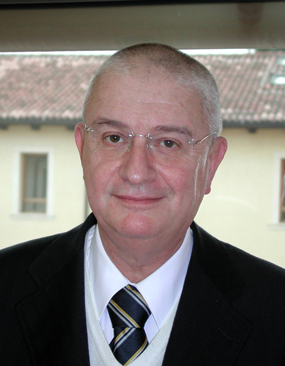Studying at the University of Verona
Here you can find information on the organisational aspects of the Programme, lecture timetables, learning activities and useful contact details for your time at the University, from enrolment to graduation.
Academic calendar
The academic calendar shows the deadlines and scheduled events that are relevant to students, teaching and technical-administrative staff of the University. Public holidays and University closures are also indicated. The academic year normally begins on 1 October each year and ends on 30 September of the following year.
Course calendar
The Academic Calendar sets out the degree programme lecture and exam timetables, as well as the relevant university closure dates..
| Period | From | To |
|---|---|---|
| 1° periodo di lezioni | Oct 2, 2017 | Dec 15, 2017 |
| Periodo riservato ad eventuali recuperi di lezioni - dicembre 2017 | Dec 16, 2017 | Dec 19, 2017 |
| 2° periodo di lezioni - febbraio/marzo 2018 | Feb 12, 2018 | Mar 26, 2018 |
| 2° periodo di lezioni - aprile/maggio 2018 | Apr 4, 2018 | May 9, 2018 |
| Periodo riservato ad eventuali recuperi di lezioni - maggio 2018 | May 10, 2018 | May 11, 2018 |
| Session | From | To |
|---|---|---|
| Sessione straordinaria - studenti f.c. - dicembre 2017 | Dec 20, 2017 | Dec 23, 2017 |
| Sessione invernale - 1° appello | Jan 9, 2018 | Jan 17, 2018 |
| Sessione invernale - 2° appello | Jan 31, 2018 | Feb 8, 2018 |
| Sessione straordinaria - studenti f.c. - marzo 2018 | Mar 27, 2018 | Mar 29, 2018 |
| Sessione estiva - 1° appello | May 12, 2018 | May 23, 2018 |
| Sessione estiva - 2° appello | Jun 8, 2018 | Jun 18, 2018 |
| Sessione estiva - 3° appello | Jul 5, 2018 | Jul 14, 2018 |
| Sessione autunnale - 1° appello | Aug 27, 2018 | Sep 5, 2018 |
| Sessione autunnale - 2° appello | Sep 20, 2018 | Sep 29, 2018 |
| Session | From | To |
|---|---|---|
| Termine presentazione tesi di laurea - Sessione ottobre 2017 | Sep 22, 2017 | Sep 22, 2017 |
| Sessione autunnale - ottobre 2017 | Oct 23, 2017 | Oct 24, 2017 |
| Termine presentazione tesi di laurea - Sessione invernale | Jan 10, 2018 | Jan 10, 2018 |
| Sessione invernale | Feb 9, 2018 | Feb 9, 2018 |
| Termine presentazione tesi di laurea - Sessione marzo 2018 | Feb 16, 2018 | Feb 16, 2018 |
| Sessione invernale - marzo 2018 | Mar 15, 2018 | Mar 19, 2018 |
| Termine presentazione tesi di laurea - Sessione estiva | May 23, 2018 | May 23, 2018 |
| Sessione estiva | Jun 26, 2018 | Jun 27, 2018 |
| Period | From | To |
|---|---|---|
| All Saints Day | Nov 1, 2017 | Nov 1, 2017 |
| Immaculate Conception | Dec 8, 2017 | Dec 8, 2017 |
| Vacanze di Natale | Dec 24, 2017 | Jan 6, 2018 |
| Easter break | Mar 30, 2018 | Apr 3, 2018 |
| Liberation Day | Apr 25, 2018 | Apr 25, 2018 |
| Festa dei lavoratori | May 1, 2018 | May 1, 2018 |
| Patron Saint Day | May 21, 2018 | May 21, 2018 |
| Republic Day | Jun 2, 2018 | Jun 2, 2018 |
Exam calendar
Exam dates and rounds are managed by the relevant Law Teaching and Student Services Unit.
To view all the exam sessions available, please use the Exam dashboard on ESSE3.
If you forgot your login details or have problems logging in, please contact the relevant IT HelpDesk, or check the login details recovery web page.
Academic staff
 giovanni.alberti@univr.it
giovanni.alberti@univr.it

Dalla Massara Tommaso
 tommaso.dallamassara@univr.it
tommaso.dallamassara@univr.it
 +39 045 8028810
+39 045 8028810
 roberto.flor@univr.it
roberto.flor@univr.it
 rita.maggi@univr.it
rita.maggi@univr.it

Patrono Paolo
 paolo.patrono@univr.it
paolo.patrono@univr.it
 +39 045 8028813
+39 045 8028813
 lorenzo.salvatore@univr.it
lorenzo.salvatore@univr.it
Strano Silvana
 silvana.stranoligato@univr.it
silvana.stranoligato@univr.it
 +39 045 8028856
+39 045 8028856
 claudio.tomazzoli@univr.it
claudio.tomazzoli@univr.it
 marcella.veronesi@univr.it
marcella.veronesi@univr.it
Study Plan
The Study Plan includes all modules, teaching and learning activities that each student will need to undertake during their time at the University.
Please select your Study Plan based on your enrollment year.
1° Year
| Modules | Credits | TAF | SSD |
|---|
2° Year activated in the A.Y. 2018/2019
| Modules | Credits | TAF | SSD |
|---|
3° Year activated in the A.Y. 2019/2020
| Modules | Credits | TAF | SSD |
|---|
| Modules | Credits | TAF | SSD |
|---|
| Modules | Credits | TAF | SSD |
|---|
| Modules | Credits | TAF | SSD |
|---|
Legend | Type of training activity (TTA)
TAF (Type of Educational Activity) All courses and activities are classified into different types of educational activities, indicated by a letter.
Private Law (2017/2018)
Teaching code
4S00383
Teacher
Coordinator
Credits
9
Language
Italian
Scientific Disciplinary Sector (SSD)
IUS/01 - PRIVATE LAW
Period
1° periodo di lezioni dal Oct 2, 2017 al Dec 15, 2017.
Learning outcomes
Objectives
This course, studying the basics, attends to analyze the traditional area of private law, including the most relevant methodological issues. Considering the influence of European Law, the course deepens the knowledge of private law concept under a global prospective of the system.
The teaching will focus on the general part of private law, and on the laws of persons and legal persons, subjective rights, obligations and corresponding sources, specific contracts, consumer contracts, lawful sources of obligation, different from contracts; unlawful acts as sources of obligations.
Students will be able: to understand the main emerging and practical issues; to find out and analyze legislative sources; to acquire skills to understand the main questions and their critical issues.
Teaching Methods
Lectures, with active participation by the students including through the analysis of case studies. Students are strongly advised to come to lectures with Civil Code and the relevant legislation, that will be given at lectures, so that they can develop an adequate ability to read and interpret the law.
Program
Program
General concept: legal system, legal sources, law enforcement, subjective positions, contractual and non-contractual relationships.
The influence of time in legal relationships: prescription and peremptory time limits.
Facts and legal acts (classification of contracts). Primary elements of legal acts. Register and publication of legal facts.
Rules of evidence and jurisdictional context.
Law of persons. Natural persons. The existential situations. Legal persons and unrecognized institutions.
Law of obligations. Breach of contracts and obligations. Guaranties. Forced execution of credit.
Sources of obligation. Analyse of contract: formation, replacement in contractual activities, invalidity of the contract, effectiveness and execution.
Types of contracts.
Lawful sources of obligation, different from contracts (only definitions regarding the bills of exchange). Unlawful acts as sources of obligations.
Text
Francesco Ruscello, Compendio di Istituzioni di diritto privato, Amon, Padova, latest edition, from chapter I to XXIV.
Students can use the follow text to verify their level of knowledge:
Francesco Ruscello, Esercizi di Istituzioni di diritto privato, Padova, Amon, 2015
Suggest use of the last edition of civil Code and legal framework, Italian Constitution and EU Treaties. Further indications as to reading material on specific topics will be given at lectures and posted on the lecturer's webpage.
| Author | Title | Publishing house | Year | ISBN | Notes |
|---|---|---|---|---|---|
| Francesco Ruscello | Compendio di Istituzioni di diritto privato | Amon | 2018 | Dal capitolo I a XXIV. |
Examination Methods
Exam
The final exam consists of two parts: pre-selection tests (multiply choice), to verify the knowledge of basic, followed by an oral exam to ensure the comprehension of theory and practical questions in program.
Teaching materials e documents
-
 programma e testi consigliati (engl)
(octet-stream, it, 14 KB, 17/01/18)
programma e testi consigliati (engl)
(octet-stream, it, 14 KB, 17/01/18)
-
 programma e testi consigliati (ita/)
(octet-stream, it, 15 KB, 17/01/18)
programma e testi consigliati (ita/)
(octet-stream, it, 15 KB, 17/01/18)
Type D and Type F activities
Le attività che consentono l’acquisizione dei crediti riservati alle attività formative a libera scelta dello studente (TAF D) sono le seguenti:
• Un insegnamento previsto nell’elenco delle attività formative (TAF D) allegato al piano didattico del corso di laurea in Scienze dei servizi giuridici;
• Un insegnamento attivato nei Corsi di studi afferenti al Collegio di Giurisprudenza;
• Un laboratorio didattico attivato nei Corsi di studi afferenti al Collegio di Giurisprudenza;
• Un laboratorio didattico attivato nei Corsi di studi afferenti al Dipartimento di Scienze Giuridiche;
• Un insegnamento previsto dall’Offerta Formativa di Ateneo, non impartito nell’ambito dei corsi di studi afferenti al Collegio di Giurisprudenza: il riconoscimento dei crediti acquisiti sarà subordinato alla preventiva presentazione di coerenti programmi formativi valutati dalla Commissione istruttoria per la didattica e approvati dal Collegio didattico.
• Attività formative organizzate dai singoli docenti del Collegio di Giurisprudenza o del Dipartimento di Scienze Giuridiche: previa approvazione del Collegio ad esse verrà attribuito, dopo un’apposita verifica, un credito per ogni 6 ore di frequenza obbligatoria;
• Attività formative che implicano la partecipazione a convegni o seminari organizzati sotto il “logo” del Dipartimento di Scienze Giuridiche o dell’Ateneo: devono essere preventivamente approvate dal Collegio di Giurisprudenza indicando un docente di riferimento del Collegio di Giurisprudenza ovvero del Dipartimento di Scienze Giuridiche. Un credito per ogni giornata di convegno o di seminario si acquisisce dopo apposita verifica che dimostri l’avvenuta fruizione culturale del tema del convegno o del seminario.
Le attività che consentono l’acquisizione dei crediti riservati alle ulteriori attività formative (TAF F) sono le seguenti:
• Informatica (3 cfu)
• Stage;
• Un laboratorio didattico attivato nei Corsi di studi afferenti al Collegio di Giurisprudenza;
• Un laboratorio didattico attivato nei Corsi di studi afferenti al Dipartimento di Scienze Giuridiche.
Al link https://www.univr.it/it/i-nostri-servizi/segreterie-studenti/giurisprudenza#categdoc_7103 la modulistica per l'inserimento di attività non selezionabili in autonomia dallo studente in sede di compilazione del piano degli studi.
| years | Modules | TAF | Teacher | |
|---|---|---|---|---|
| 3° | Civil enforcement law | D |
Alberto Maria Tedoldi
(Coordinator)
|
|
| 3° | Foundations and models in Sales Law | D |
Tommaso Dalla Massara
(Coordinator)
|
|
| 2° 3° | International arbitration law | D |
Annalisa Ciampi
(Coordinator)
|
|
| 2° 3° | Family Law | D |
Alessandra Cordiano
(Coordinator)
|
|
| 2° 3° | Ecclesiastical law | D |
Giuseppe Comotti
(Coordinator)
|
|
| 2° 3° | Economics, financial statement and control of Italian healthcare and social care organizations | D |
Paolo Roffia
(Coordinator)
|
|
| years | Modules | TAF | Teacher | |
|---|---|---|---|---|
| 3° | International criminal law | D |
Lorenzo Picotti
(Coordinator)
|
|
| 3° | Notarial law | D |
Lorenzo Salvatore
(Coordinator)
|
|
| 2° 3° | Banking law | D |
Giovanni Meruzzi
(Coordinator)
|
|
| 2° 3° | CRISIS AND INSOLVENCY PROCEEDINGS LAW | D |
Alberto Maria Tedoldi
(Coordinator)
|
|
| 2° 3° | Company Economics | D |
Chiara Leardini
(Coordinator)
|
|
| 2° 3° | Juvenile Law | D |
Silvana Strano
(Coordinator)
|
|
| 2° 3° | Legal Medicine | D |
Domenico De Leo
(Coordinator)
|
|
| 2° 3° | Sociology of law | D |
Daniele Velo Dalbrenta
(Coordinator)
|
|
| years | Modules | TAF | Teacher | |
|---|---|---|---|---|
| 3° | International criminal law | D |
Lorenzo Picotti
(Coordinator)
|
|
| 3° | Notarial law | D |
Lorenzo Salvatore
(Coordinator)
|
|
| 2° 3° | Banking law | D |
Giovanni Meruzzi
(Coordinator)
|
|
| 2° 3° | CRISIS AND INSOLVENCY PROCEEDINGS LAW | D |
Alberto Maria Tedoldi
(Coordinator)
|
|
| 2° 3° | Company Economics | D |
Chiara Leardini
(Coordinator)
|
|
| 2° 3° | Juvenile Law | D |
Silvana Strano
(Coordinator)
|
|
| 2° 3° | Legal Medicine | D |
Domenico De Leo
(Coordinator)
|
|
| 2° 3° | Sociology of law | D |
Daniele Velo Dalbrenta
(Coordinator)
|
|
Career prospects
Module/Programme news
News for students
There you will find information, resources and services useful during your time at the University (Student’s exam record, your study plan on ESSE3, Distance Learning courses, university email account, office forms, administrative procedures, etc.). You can log into MyUnivr with your GIA login details: only in this way will you be able to receive notification of all the notices from your teachers and your secretariat via email and also via the Univr app.
Internships
Internships are aimed at enabling students to gain direct knowledge of the world of work and to acquire specific professional skills.
Internships are carried out under the responsibility of an individual lecturer, and can be carried out in professional firms, public administration bodies and companies recognised by the University of Verona.
Any CFU credits gained by doing internships will be recognised and recorded by the University in accordance with the relevant University regulations in force (Regolamento d’Ateneo per il riconoscimento dei crediti maturati negli stage universitari).
For further information on internships, please go to: https://www.univr.it/it/i-nostri-servizi/stage-e-tirocini.
































